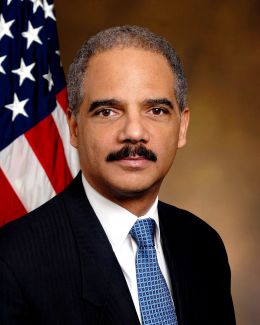A Complicated Path
News Analysis: Attorney General Holder's unusual decision to intervene in Paul Wilson Dorman's immigration case shows the current law's difficulties – for same-sex couples and the government
In El Paso, Texas, on May 10, President Barack Obama told the crowd assembled for a lengthy address on comprehensive immigration reform, ”I don’t believe the United States of America should be in the business of separating families. That’s not right. That’s not who we are.”
As the case of Paul Wilson Dorman shows, the reality for same-sex couples is far more complicated – with officials, agencies and even different branches of government playing a series of overlapping, confusing roles with unclear motives and goals that leave Dorman and other would-be immigrants in the dark as to their future.

Attorney General Eric Holder
Attorney General Eric Holder’s unusual decision on May 5 to send Dorman’s case, which had been before the U.S. Court of Appeals for the Third Circuit for more than a year and was nearing oral argument, back to the Board of Immigration Appeals (BIA) – asking the BIA to answer several questions relating to Dorman and his partner’s civil union – took the immigration and LGBT communities by surprise.
The underlying case is similar in many ways to cases of legally married same-sex couples in which an American citizen is seeking a green card for his or her foreign spouse. Under the Immigration and Nationality Act (INA), a green card request – technically an I-130 petition for an alien relative – can be granted for a spouse of a U.S. citizen if other conditions are met. Section 3 of the Defense of Marriage Act, however, prevents same-sex couples from being able to meet that requirement because Section 3 limits the federal definition of ”spouse” and ”marriage” to opposite-sex couples.
With Dorman, the procedural posture of his case – he is seeking a cancellation of a removal order – and the relationship status – he has a civil union and not a marriage – are the primary, significant distinctions. The underlying question about DOMA’s constitutionality, however, remains the same.
Earlier this year, on Feb. 23, Holder – with Obama’s agreement – decided that Section 3 of the Defense of Marriage Act is unconstitutional. Although Holder also noted that the government would continue to enforce DOMA until it is repealed or struck down at the conclusion of a legal challenge, the decision – announced in a letter to House Speaker John Boehner (R-Ohio) – subsequently threw into question the ongoing treatment of same-sex couples under immigration law.
As attorney Lavi Soloway of Stop the Deportations has argued, the administration has significant discretion to take steps in the meantime to keep such families from being separated. Soloway told Metro Weekly, ”This administration can act now to ensure that no LGBT families are torn apart by instituting a moratorium on deportations of all spouses of lesbian and gay Americans until all married couples are treated equally under our immigration laws.”
To that end, Soloway and others were cautiously optimistic about the May 5 decision, in which Holder pulled Dorman’s case back from the Third Circuit by vacating the earlier BIA decision in Dorman’s case and remanding it to the BIA to answer four questions, two of which are related to spousal recognition. Holder asked the BIA to answer whether partners in civil unions are considered spouses under New Jersey law and whether the INA would recognize partners in civil unions as spouses if DOMA didn’t exist.
As Immigration Equality spokesman Steve Ralls said at the time, ”The question now is whether the attorney general’s action in this case foreshadows future action that would halt the separation of LGBT immigrant families. We hope the answer is yes.”
Perhaps more importantly, by placing the decision back in the hands of the BIA, the executive branch regains control over the case for the time being because, although referred to as a court, the BIA and immigration courts below it actually are administrative bodies created under the Justice Department. By remanding the case to the BIA, the case is removed from the Third Circuit – thought of as one of the more conservative appellate courts – and also taken out of the realm of cases in which the House Republican leadership can intervene to defend DOMA.
The impact of Holder’s decision was quickly felt when an immigration judge adjourned deportation proceedings in another case for one of Soloway’s clients, Henry Velandia, the very next day, May 6. As Soloway said that day of the judge’s action, ”He cited the potential that the government might be looking at a different way of approaching the definition of marriage for immigration purposes, and so, it was appropriate to adjourn in light of that decision to vacate.”
On Saturday, May 7, a Justice Department spokeswoman, Tracy Schmaler, however, told The New York Times that the May 5 decision – despite the coverage and ripple effect – was a limited one. According to the Times, Schmaler explained that Holder ”had interceded in Mr. Dorman’s case only because he wanted the immigration appeals court to decide issues he felt had been overlooked. ‘As we have made clear, we will continue to enforce DOMA,’ Ms. Schmaler said.”
Although the May 5 decision brought the case national attention, the groundwork was being laid the week prior. On April 27, the Department of Justice had filed a motion before the Third Circuit – unopposed by Dorman’s lawyer – to dismiss the case for lack of jurisdiction, presumably because of the decision to vacate the BIA’s earlier decision in Dorman’s case.
Dorman’s attorney, Nicholas Mundy, spoke with Metro Weekly about Dorman’s request for a cancellation of his removal order, saying it initially was denied on March 4, 2009, ”because he was found to be ineligible for that form of relief as a threshold matter because he did not have a qualifying relative for cancellation of removal” – as in, a spouse.
The BIA decision vacated by Holder this past week had upheld the initial denial in a one-sentence opinion on January 27, 2010, according to Mundy. ”And then we went to the Third Circuit.”
Over the course of 2010, briefs were filed in the case by Mundy for Dorman and by the Department of Justice in the Third Circuit. Dorman’s brief, filed in late July 2010, was submitted more than a half-year before Holder would decide that Section 3 of DOMA was unconstitutional.
Of that filing, Mundy said, ”I think my primary argument at the time … was Judge [Joseph] Tauro in Massachusetts [in Gill v. Office of Personnel Management].” On July 8, 2010, Tauro – a judge in the U.S. District Court for the District of Massachusetts – found Section 3 of DOMA to be unconstitutional. That case currently is on appeal before the U.S. Court of Appeals for the First Circuit – but Mundy was nonetheless able to cite Tauro’s opinion as an example of a court that had found DOMA to be unconstitutional.
On Feb. 23 – before oral argument had even been held in Dorman’s case – Holder sent his letter to Boehner stating that he, too, had reached the decision that Section 3 of DOMA was unconstitutional.
In a letter filed in the Third Circuit the next day, Assistant Attorney General Tony West – head of the Justice Department’s civil division – stated that Dorman’s case ”involves the constitutionality of Section 3 of [DOMA],” detailed the president and attorney general’s view expressed the day before that Section 3 of DOMA is unconstitutional as applied to legally married same-sex couples, and stated that the Justice Department ”will cease its defense of Section 3 in such cases.”
West added, ”Further, as the Attorney General explained in the [Feb. 23] letter, we hereby ‘notify the courts of our interest in providing Congress a full and fair opportunity to participate in the litigation in those cases.’ In addition, we ‘will remain parties to the case and continue to represent the interests of the United States throughout the litigation.”’
A third letter, this one sent on Feb. 25 to Boehner by Assistant Attorney General for Legislative Affairs Ronald Weich, provided ”follow-up information concerning those pending cases where Section 3 of the Defense of Marriage Act has been challenged and where the Department of Justice will cease its defense of Section 3.” The letter included an attachment listing 11 ”[p]ending cases where the Defense of Marriage Act is being challenged” – yet Dorman’s case is not listed.
Boehner’s spokesman, Brendan Buck, told Metro Weekly on May 10 that the speaker’s office was never informed by the Department of Justice about the Dorman case.
Asked why not, the Justice Department’s Schmaler replied via email to Metro Weekly on May 10, ”This case does not implicate the Attorney General and President’s decision not to defend in cases involving legally married same-sex couples because the couple in this case is in a civil union.”
The letter filed in the Third Circuit on Feb. 24, although referencing that the Feb. 23 letter’s conclusion was premised upon the existence of a same-sex marriage legally recognized in a state, stated directly that Dorman’s case ”involves the constitutionality of Section 3” of DOMA.
Schmaler, however, went on to explain, ”The decision to remand was for the BIA to further consider the full range of issues to ensure that any constitutional question is squarely presented on appeal. Thus, it was premature to notify Congress to defend the constitutionality of DOMA in this case.”
Although that explains why Congress is not appropriately involved in the case now, that did not answer why Congress was not notified of the case in the more than two months between when West notified the Third Circuit that Dorman’s case involved the constitutionality of DOMA and when the government filed its motion on April 27 to dismiss the case from the Third Circuit.
On May 11, however, Schmaler wrote of the Feb. 24 letter, ”That letter to the court in no way stated that we were not defending DOMA in that case, and it repeated that the determination applied only to married couples.”
It was, however, virtually the same exact wording as a letter filed by West in the Gill appeal and other challenges that were listed in the Feb. 25 letter to Boehner regarding the cases in which the Justice Department would not be defending DOMA. Additionally, the questions directed to the BIA in Holder’s May 5 decision ask ”whether and how the constitutionality of DOMA is presented” in Dorman’s case, which suggests that, Schmaler’s comments notwithstanding, senior Justice Department lawyers, including Holder, still believe that DOMA’s constitutionality could be at issue in Dorman’s case.
In the meantime and regardless of the happenings before the Third Circuit prior to Holder’s May 5 decision, Dorman’s case is now before the BIA, where it could answer Holder’s questions or send the matter back down to an immigration court judge.
Mundy says that he expects the BIA to ”send the case back to the immigration judge … to allow for additional evidentiary hearings.”
But also, he adds, ”to pass the hot potato to someone else.”
Support Metro Weekly’s Journalism
These are challenging times for news organizations. And yet it’s crucial we stay active and provide vital resources and information to both our local readers and the world. So won’t you please take a moment and consider supporting Metro Weekly with a membership? For as little as $5 a month, you can help ensure Metro Weekly magazine and MetroWeekly.com remain free, viable resources as we provide the best, most diverse, culturally-resonant LGBTQ coverage in both the D.C. region and around the world. Memberships come with exclusive perks and discounts, your own personal digital delivery of each week’s magazine (and an archive), access to our Member's Lounge when it launches this fall, and exclusive members-only items like Metro Weekly Membership Mugs and Tote Bags! Check out all our membership levels here and please join us today!






















